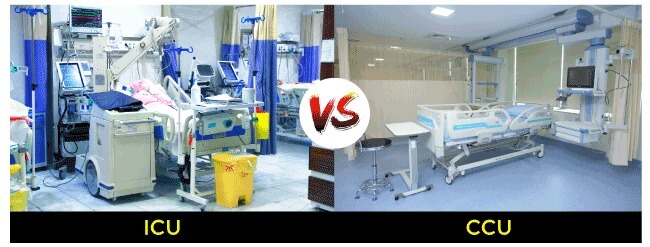Difference between ICU and CCU
There are different types of wards in a hospital, like a private ward, general ward, special wards, ICU, CCU, and semi-special wards. When the patient has a normal disease, then he is kept in the general ward, however, patients can choose any wards from special, semi special, and deluxe based on their budget. However, if the patients have severe disease or serious condition, they are kept in the special care units that are ICU and CCU. Let us see how these units differ from each other!

ICU
It is an abbreviation of intensive care unit. The patients who have severe disease are kept in ICU. Patients staying in this ward need more care and advanced medical treatment. Trained health care professionals are appointed in this ward. They remain active in this ward for 24 hours. They take care of patients and also monitor their health conditions. There are many kinds of patients in ICU, but one thing that is needed for everyone is constant observation and special care. Furthermore, very few people are allowed to meet patients in this ward.
Equipment used in the ICU
A lot of advanced equipment are used in ICU, some of which are as follow;
- Heart monitor: In this, the patient's heart movements are shown in the form of a wave on the screen.
- Ventilator: It is used when the patient is in a very serious condition and he is able to breathe and speak.
- Feeding tube: If a patient is not able to eat food normally that time feeding tubes are used to feed the patient.
- Ferns and catheters: Ferns are used to remove blood or any kind of fluid from the body. Catheters are used to remove urine. This tube is inserted into the bladder to drain urine.
Which patients are kept in ICU?
- When the patient's condition is very serious.
- Patients who have undergone surgery are kept in this ward.
- The patients, who need constant observation and special care.
- Patients who have serious diseases such as liver failure and kidney failure, etc.
- Patients with severe infections like pneumonia, sepsis, etc.
Principal of ICU:
- One health care professional is appointed for each patient.
- Very few people are allowed to meet the patient, and they have to keep their phone offs and maintain silence in the ward.
- Take care of patients and observing health activity is the duty of health care professionals.
CCU
It is an abbreviation of cardiac care unit. Heart disease is the world's biggest killer, according to WHO. Some hospitals have specialized care units, for the patient who suffers from heart problems, which are known as cardiac care unit. This unit is found in larger hospitals and heart specialist hospitals where regular heart surgery is performed. Doctors, nurses, and trained healthcare staff are appointed in this unit to take care of the patients.
Which patients are kept in CCU?
- When patients undergo heart surgery.
- After the coronary bypass surgery, the patient is kept in CCU.
- When patients suffer from heart failure, cardiac arrest, etc.
Equipment used in the CCU
- ECG machine: All activity performed by the heart is mothering by an ECG machine, which displays that activity through the graph. In that graph, R shows the pumping speed of the heart and, p shows the speed of bold entering into the heart.
- Blood pressure machine: The speed and pressure of blood are measured by using this machine.
- Chest Tube: It is used to remove air from the chest, and it is inserted into the chest.
- Respirator: It is used to supply oxygen to the lungs and help patients for breathing.
- PICC line: This is a thin tube used to supply the medicine directly to the large veins that are near to heart.
Difference between ICU and CCU
| ICU |
CCU |
| It stands for Intensive care unit. |
It stands for Cardiac care unit. |
| This unit is available in all general hospitals. |
This unit is available mostly in heart specialist hospitals. |
| The patients suffering from any type of the severe disease are kept in ICU. |
The patients suffering from severe heart disease are kept in CCU. |
| Example: kidney failure, pneumonia, sepsis, severe injury due to accident, etc. |
Examples: heart failure, coronary bypass surgery, heart surgery, etc. |
|

 For Videos Join Our Youtube Channel: Join Now
For Videos Join Our Youtube Channel: Join Now










